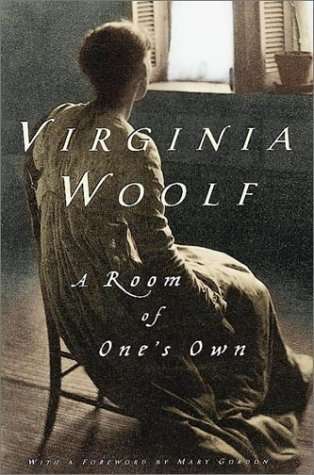
A Room of One's Own is an extended essay by Virginia Woolf. First published on 24 October 1929,
the essay was based on a series of lectures she delivered at Newnham College and Girton College,
two women's colleges at Cambridge University in October 1928. While this extended essay in fact
employs a fictional narrator and narrative to explore women both as writers of and characters in fiction,
the manuscript for the delivery of the series of lectures, titled "Women and Fiction", which was
published in Forum March 1929, and hence the essay, are considered non-fiction. The essay
is generally seen as a feminist text, and is noted in its argument for both a literal and
figural space for women writers within a literary tradition dominated by patriarchy.
Quotes and thoughts while reading:
"... and I thought... of the safety and prosperity of the one sex and of the poverty and insecurity
of the other and of the effect of tradition and of the lack of tradition upon the mind of the writer." (p 24)
"A very elementary exercise in psychology, not to be dignified by the name of psycho-analysis, showed me, on looking
at my notebook, that the sketch of the angry professor had been made in anger... to the one book, to the one phrase, which
had roused the demon; it was the professors statement about the mental, moral and physical inferiority of women. My heart
had leapt. My cheeks had burnt. I had flushed with anger... " (p 32)
"Women have served all these centuries as looking-glasses possessing the magic and delicious power of reflecting
the figure of man at twice its natural size... That is why Napoleon and Mussolini both insist so emphatically upon
the inferiority of women, for if they were not inferior, they would cease to enlarge." (p 36)
"Anything may happen when womanhood has ceased to be a protected occupation..."(p 40). Woolf makes the claim that in 100 years,
women will be working all the same jobs as men, serving in the armed forces, and the values of her time will have changed completely.
We have 14 years to go until 2029, I wonder what we will see at that time.
"A very queer composite emerges. Imaginatively she is of the highest importance; practically she is completely insignificant. She pervades
poetry cover to cover, she is all but absent from history. She dominates the lives of kings and conquerors in fiction; in fact she was the
slave of any boy whose parents forced a ring on her finger. Some of the most inspired words, some of the most profound thoughts in
literature fall from her lips; in real life she could hardly read, could scarcely spell, and was the property of her husband." (p 44)
"When, however, one reads of a witch being ducked, of a woman possessed by devils, of a wise woman selling herbs... then I think we are on the
track of a lost novelist, a suppressed poet, of some mute and inglorious Jane Austen, some Emily Bronte who dashed her brains out on the
moor or mopped and mowed about the highways crazed with the torture that her gift had put her to." (p 49)
"Thus, I concluded, ... it is fairly evident that even in the nineteenth century a woman was not encouraged to be an artist. On the
contrary, she was snubbed, slapped, lectured and exhorted..." (p55)
Woolf, in 1929, brings up a very similar idea to the Bechdel test, in literature, not film. "And I tried to remember any case in the course
of my reading where two women are represented as friends... But almost without exception they are shown in their relation to men." (p82)
"... she wrote as a woman, but as a woman who has forgotten she is a woman, so that her pages were full of that curious sexual quality which comes
only when sex is unconscious of itself." (p 93)
[Coleridge] meant, perhaps, that the androgynous mind is the resonant and porous; that it transmits emotion without impediment; that it is
naturally creative, incandescent and undivided." (p 98)
"It is fatal to be a man or woman pure and simple; one must be woman-manly or man-womanly." (p 104)
"Intellectual freedom depends upon material things. Poetry depends upon intellectual freedom." (p 108) And here, in simplest terms, is why
"women... have not had a dog's chance of writing poetry." (p 108)
I wish, with my everything, that this book was easier to read, so that more people could gain this valuable insight into life in the early 20th
century, and life as a woman in other centuries. Because of books like this my world view changes, but overcoming the way in which
this was written, I believe, is too difficult for most. Above is a synthesis of what most spoke to me. Grab a copy, flip to some
of my pages and read around. Woolf has so much to say, and was extraordinary.
© JKloor 2015 Books
